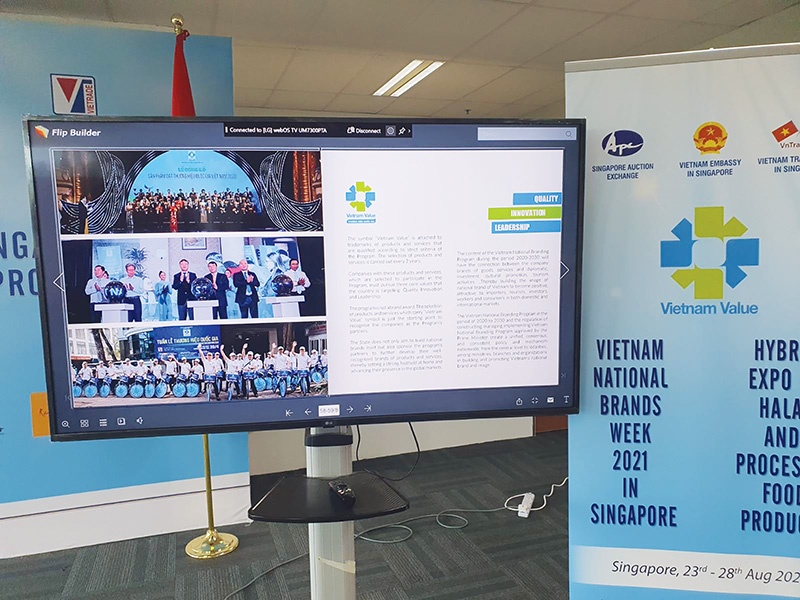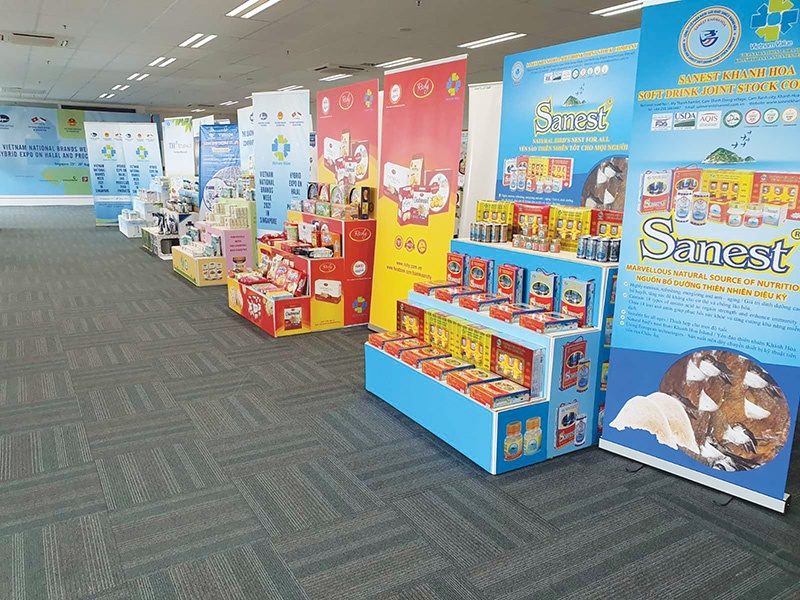 |
| The hybrid exhibition was the first for Singaporeans to get to know the Vietnam Value Programme |
The Vietnamese Embassy to Singapore, the Vietnam Trade Promotion Agency (Vietrade) under the Ministry of Industry and Trade (MoIT), and the Vietnam Trade Office in Singapore have deployed solutions to support businesses and solve difficulties in the country, as well as expand the export markets for Vietnamese products, especially agricultural goods that are highly processed and offer high added value.
Among these goods are Vietnamese lychee, which has been present in the Singaporean supermarket system since last year. In its first export season, Vietnam became the fourth-largest lychee exporter to Singapore, surpassing major exporter Madagascar.
Also last year, lychee entered the list of the top 10 fruit and vegetable exports of Vietnam to Singapore. In that market’s supermarkets, Vietnamese lychee is always in short supply, competing well with Chinese lychee despite their higher prices.
The pandemic has hurt global supply chains and international trade, causing difficulties for businesses on all sides, from lack of supply and rising transport prices to border closures and interrupted shipping operations. With its strengths in digital technology and e-commerce, Singapore is committed to continuing to promote trade flows, especially with Vietnam.
New approaches
Hybrid events are the new approaches amid the pandemic. The MoIT in coordination with the Vietnamese Embassy of Singapore and Singapore’s Ministry of Industry and Trade co-organised “Vietnam’s National Brands Weeks 2021 in Singapore – Hybrid Expo on Halal and Processed Food Products”, which was a practical example of this kind of event. This was the very first hybrid exhibition for Vietnam organised overseas, featuring physical product displays and online business-to business matching. It was also the first time the Vietnamese government’s National Branding Programme was widely promoted to the Singaporean business community and multinational companies based in the nation.
The exhibition was held on August 23-28, both online and offline. To ensure the highest connection efficiency and safety for visitors, businesses were arranged in groups of no more than eight people, and Zoom tables were established with Vietnamese businesses with the support of Vietrade and the Vietnam Trade Office in Singapore.
The exhibition offered promotion opportunities for a variety of high-quality Vietnamese products to Singaporean importers, who could connect and explore new partnerships with manufacturers from Vietnam.
Do Thang Hai, Deputy Minister of Industry and Trade, said that this event was an important milestone of the trade cooperation between Vietnam and Singapore, and an asserting premise for the cooperative spirit of the upcoming MoU between the ministries of Industry and Trade of both countries.
Mai Phuoc Dung, Vietnamese Ambassador to Singapore, said, “Promoting agricultural trade cooperation, Vietnam and Singapore wish to ensure supply chain stability and food security for the people. The exhibition was a testament to Singaporean and international friends of the Vietnamese government and businesses to promote trade flows and avoid supply disruptions.”
Vietnam’s agricultural products have now many opportunities to develop in Singapore. The city state advocates a relatively open import policy, with more than 150 export partner countries. As the state has almost no agriculture on its own, Singapore depends largely on imports to ensure the domestic demand.
Douglas Foo, chairman of the Federation of Singapore Manufacturers, said that the country has always had to work to ensure supply. Meanwhile, Vietnamese manufacturers met difficulties in output targets for their products amid current restrictions.
“Thus, the cooperation is a win-win for both countries,” said Foo. “The exhibition has created opportunities for Singaporean businesses to understand more about Vietnamese brands and products, and build a sustainable supply chain.”
The exhibition was also the first in which Singaporean organisations could receive more information about the Vietnam Value Programme and its national brands.
Tan Lijin, director of the Singapore Commodity Exchange, found that Vietnam’s processed products are accounting for an increasing value in the share of global agricultural trade. Lijin believed that Vietnamese exporters will have many opportunities and new ways to access international markets, including online auctions.
 |
| Various provinces could benefit from Singaporean food producers |
Positive and proactive
The Mekong Delta province of An Giang is famous for many kinds of agricultural export goods. Tran Anh Thu, Vice Chairman of An Giang People’s Committee, said that the pandemic has affected enterprises, and disturbed the export market. “The supply chain for agricultural goods has an urgent need for appropriate adjustments to be able to offer its products to the market,” Thu said.
During the peak of the pandemic, export activities to major markets such as China, South Korea, Japan, the United States, the European Union, and ASEAN took place very slowly and fell sharply in volume, mainly due to travel and trade restrictions, leading to mass cancellations of export contracts.
The potential for cooperation with Singapore’s food producers could be a catalyst for provinces like An Giang as both, Vietnam and Singapore, have many free trade agreements with the EU and the United Kingdom.
Singapore has a duty-free export quota of 50,000 tonnes for processed foods to the European continent. Therefore, Singaporean groups are very interested in sourcing raw materials from Vietnam to take advantage of the principle of origin.
Singapore is also a major halal food supplier to the world, with an ever-expanding market share. Tran Thu Quynh, Vietnam’s trade counsellor in Singapore, thinks these are opportunities for Vietnam to do outsourcing for Singaporean brands. “If we can make good use of these advantages, the prospects for Vietnam’s agricultural products will be better and better,” Quynh said.
“However, right now Vietnamese businesses are paying little attention to this market, due to its small capacity and high requirements on standards, quality, and price,” Quynh commented.
According to her, there are three potential groups of products for Vietnamese enterprises to export to the Singaporean market, namely agro-fishery products such as vegetables, cashew nuts, rubber, and processed foods; raw materials and minerals such as coal; and processed goods like confectionery, chemicals, wood products, and toys and sports equipment. “Vietnamese exporters need to actively participate in trade promotion activities held in Singapore to introduce and promote their products,” Quynh advised, adding that in order to increase exports to Singapore, local companies need to improve their competitiveness, build brands, invest in technology, and add value to their export products.
Moreover, Quynh recommended that enterprises focus on standards for post-harvest preservation, packaging design, user manuals, and product quality, all the while improving quality and reputation, as well as ensuring food hygiene and safety standards.
Whenever the pandemic is controlled in Southeast Asia, businesses can restart to build brands, maintain stable export activities, and bring Vietnamese goods into foreign distribution channels through trade promotion activities.
“For this, the online channel is very important,” said Do Phuong Dung, deputy director of the Asia-Africa Market Department under the MoIT.
However, Vietnamese businesses “still lack information about their trading partners, needs, tastes, and market capacity, as well as trade policies and import and export regulations,” Dung commented.
According to Dung, businesses must improve the quality of products and services, and establish professional production processes in accordance with regional and international standards. Moreover, Dung advised local businesses to dare to cope with international integration and reach out to big markets. By doing so, local companies could establish prestigious Vietnamese brands in the regional and international arenas.



